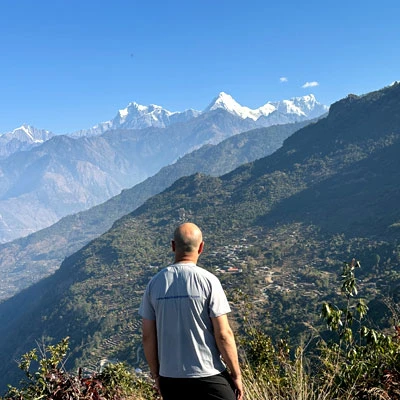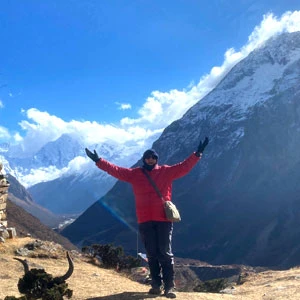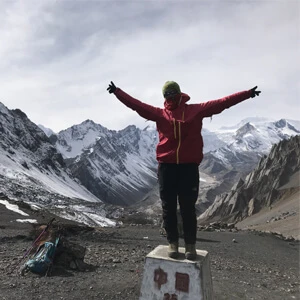Types Of Permits Required For The Kanchenjunga Trek
To trek within the restricted Kanchenjunga region, you will require two primary permits: the Restricted Area Permit (RAP) and the Kanchenjunga Conservation Area Project (KCAP) Permit. Having both these permits ensures legal and responsible trekking in this pristine area.
Restricted Area Permit (RAP)
Unlike other popular trekking regions in Nepal, Kanchenjunga remains off the beaten path with its untouched beauty, delicate ecosystem, and unique cultural integrity of the indigenous communities. Hence, its restricted status ensures that only responsible and well-prepared trekkers venture into this remote wilderness. With this designation, your trek will be a part of sustainable tourism, minimizing environmental and cultural disruption.
To access this Restricted Area Permit (RAP), it costs you USD 20 per person per week for the first week and $10 USD per person for each additional week. Additionally, with RAP, you need to trek with a licensed guide and a minimum of two trekkers in your group. In the end, the allocated fund of this permit directly contributes towards conservation and community development initiatives.
Kanchenjunga Conservation Area Project (KCAP) Permit
The KCAP permit is a contribution to protect this ecologically diverse region. It preserves the rich biodiversity of the area as well as the unique cultural heritage of the local communities, ensuring that remote lifestyles coexist harmoniously with tourism. The funds collected from this permit help maintain the trails and provide resources for community development.
Here, obtaining KCAP is quite straightforward and it costs NRs 2,000 (approximately USD 15) per person. This permit is applicable to all trekkers trekking into the conservation zone, including both the northern and southern sections of the trek. Once you buy this permit, it is valid for the entire duration of your trek within the Kanchenjunga Conservation Area.
Additional Permit Information
While navigating the permit process for the Kanchenjunga Trek, you need to carefully plan and adhere to Nepal’s regulations. You must only get the permits through registered trekking agencies, carry them at all times for inspections, and comply with group travel requirements. Here, failure to secure proper permits can result in fines or the inability to continue your trek.
Permits Issued Only Through Registered Trekking Agencies
Both the Restricted Area Permit (RAP) and the Kanchenjunga Conservation Area Project (KCAP) Permit for the trek can only be issued through government-registered trekking agencies in Nepal. It ensures that your trekking journey is supported by professional services. Therefore, you must not try to obtain these permits from any other unofficial channels.
Mandatory To Carry Permits At All Times
During the Kanchenjunga Region Trek, you will come across various checkpoints where you need to verify your documents. Additionally, authorities may also ask you to see your permits at any time. However, if you fail to provide your permit for verification, your trek may end right then and there. So, you should carry the original permit all the time and you can also keep digital copies of your permits on your phone.
Consequences Of Not Having A Proper Permit
Trekking in Nepal without proper permits or no permits at all is a serious offense and the issue can escalate in several ways. Such as, you may have to pay a large sum of fine, you may get escorted back to the trek’s starting point, or may even get banned from continuing the trek. Altogether, trekking without a proper permit or no permit at all can result in the overall disruption of your plan and experience.
Permit Validity And Extensions
Since the Restricted Area Permit (RAP) is only valid for a week, you must ensure that you have calculated your trek duration correctly to avoid overstaying its validity. In any case, if you require to extend the permit’s validity, you can issue it with the help of your trekking agency before the initial permit expires.
Non-Refundable Policy
It is crucial to note that the permits you issue for your trek are not refundable, even in any unforeseen circumstances. Therefore, you must carefully plan your trek and even carry the required travel insurance to cover any unnecessary expenses.
Seasonal Considerations
If you are trekking Kanchenjunga during the peak seasons (Spring and Autumn), you must apply for the permits in advance to avoid any last-minute hassle. This is because the peak season faces higher demand for the trek which may increase the processing time for the permits.
How To Obtain Permits For The Kanchenjunga Circuit Trek
The entire process of obtaining the required permits for the Kanchenjunga Round Trek is handled by the government-licensed trekking agency. It is quite a straightforward process as the agencies are authorized to apply for permits on your behalf.
To begin with, you need to provide the agency with some essential documents:
- Copy of your passport for identity verification.
- Passport-sized photos for the permit forms.
- A copy of your Nepal visa to confirm your legal stay in the country.
Once these documents are provided, your permit application process starts. You will usually get those permits within a day or two, depending on the season and volume of applications.
Nepal Trekking Experts manage the entire process and help you get all the required permits. We ensure everything is in order and you have got the approval from the relevant authorities.
Kanchenjunga Trek Permit Application Tips
- Apply Early: Begin the permit application process at least a week before your trek to account for processing time, especially during peak trekking seasons.
- Verify Permit Details: Double-check that your permits accurately list the correct dates, trekking areas, and personal information.
- Choose A Licensed Trekking Agency: Work only with government-licensed trekking agencies to arrange your permits.
- Carry All Required Documents: Ensure you have a valid passport, Nepal visa, and passport-sized photos ready to submit with your application.
- Coordinate Permit Extensions If Needed: If your trek might extend beyond your initial plan, discuss the possibility of extending your permits with your agency in advance.
- Understand The Group Travel Requirement: Remember that the Restricted Area Permit mandates a minimum of two trekkers traveling with a licensed guide.
- Request Confirmation Receipts: Ask your trekking agency for receipts or copies of your processed permits before starting your trek.
- Plan For Application On Weekdays: Nepalese government offices are closed on Saturdays and public holidays, so plan accordingly.
Important Rules And Regulations
- No Solo Trekking Allowed: Solo trekking is strictly prohibited in the Kanchenjunga region. You must be accompanied by a licensed guide and there must be a minimum of two trekkers in a group.
- Respect Local Customs And Guidelines: Always respect the local culture and people. Seek permission before you take pictures of people or cultural sites, do not enter local homes with shoes, refrain from PDA, and avoid behavior that might offend local traditions.
- Stay On Designated Trails: Stick to the established path and do not wander off on your own.
- Adhere To The Leave No Waste Principle: Dispose of your waste in the designated area and avoid littering.
- Comply With Conservation Area Rules: Abide by the rules set for the conservation area such as not disturbing the wildlife or collecting plants from the region.
- Follow Your Trek Itinerary: Be mindful of your permit’s validity.
- Avoid Unregistered Agencies Or Freelance Guides: Always check for the guides and agencies’ validity before you book your trek with them.
- Trek During Safe Hours: Start your trek early to reach your set destination on time and avoid trekking in this remote region at dark.
Cost Breakdown For The Kanchenjunga Circuit Permits
You must understand the overall permit costs for the Kanchenjunga Circuit Trek to effectively plan your budget. The total cost of the necessary permits for this trek is relatively affordable.
With the Restricted Area Permit (RAP) priced at USD 40 per person for the first two weeks and the Kanchenjunga Conservation Area Project (KCAP) Permit at approximately USD 15 per person, the combined permit cost comes to USD 55 per person. For those trekkers who are planning for a much longer stay, you need to pay USD 10 per person per week after the initial two weeks.
Note: This fee is only inclusive of the trek’s permit cost and does not cover the charge of the trekking agency and guide.
Conclusion
Permits are non-negotiable for the Kanchenjunga Trek, and to enter this region, you will need both the Restricted Area Permit (RAP) and the Kanchenjunga Conservation Area Project (KCAP) Permit. These permits grant you access to one of Nepal’s most remote trekking destinations and also contribute to preserving its natural and cultural heritage.
Proper documentation and planning can make all the difference in your trekking experience. Hence, by working with an experienced agency like Nepal Trekking Experts, you can avoid unnecessary hassle and only focus on the adventure. From handling your permit application to providing licensed guides, you can contact us for any help to meet the legal requirements.
Kanchenjunga Trek Permits Guide FAQs
What permits do I need for the Kanchenjunga Trek?
You need two permits: the Restricted Area Permit (RAP) and the Kanchenjunga Conservation Area Project (KCAP) Permit.
How much do the permits cost?
The RAP costs USD 20 per person per week for the first week and USD 10 for each additional week. The KCAP permit costs approximately USD 15 per person.
Can I apply for the permits myself?
No, you must obtain the permits through a government-registered trekking agency in Nepal. Nepal Trekking Experts is a renowned trekking agency that can help you obtain the trekking permits.
Is solo trekking allowed in the Kanchenjunga region?
Despite the two people mandatory government rule in Kanchenjunga region treks, you can definitely trek solo if you prefer. You have to pay a ghost trekker permit and trek with our licensed guide. Nepal Trekking Experts make it possible for you.
Are the permits refundable?
No, permits are non-refundable, even if you cancel your trek or face unforeseen circumstances.
What documents are required to apply for the permits?
You need a copy of your passport, passport-sized photos, and a valid Nepal visa to apply for the permits.
What happens if I don’t carry my permits during the trek?
If you fail to present your permits at checkpoints, authorities may stop your trek, impose fines, or escort you back.







